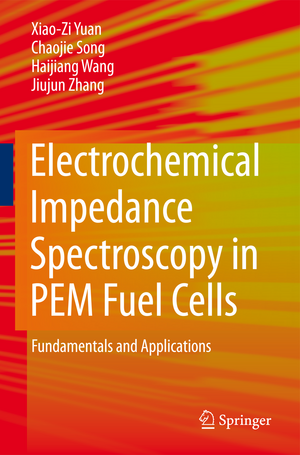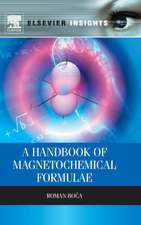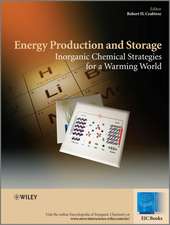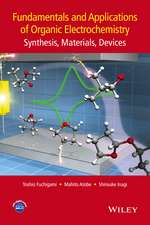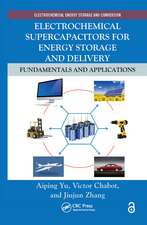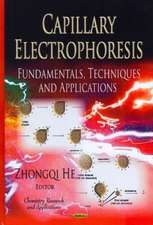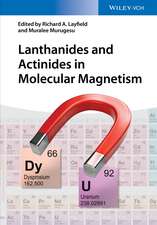Electrochemical Impedance Spectroscopy in PEM Fuel Cells: Fundamentals and Applications
Autor Xiao-Zi (Riny) Yuan, Chaojie Song, Haijiang Wang, Jiujun Zhangen Limba Engleză Hardback – dec 2009
This comprehensive reference on EIS fundamentals and applications in fuel cells contains information about basic principles, measurements, and fuel cell applications of the EIS technique. Many illustrated examples are provided to ensure maximum clarity and observability of the spectra.
"Electrochemical Impedance Spectroscopy in PEM Fuel Cells" will enable readers to explore the frontiers of EIS technology in PEM fuel cell research and other electrochemical systems. As well as being a useful text for electrochemists, it can also help researchers who are unfamiliar with EIS to learn the technique quickly and to use it correctly in their fuel cell research. Managers or entrepreneurs may also find this book a useful guide to accessing the challenges and opportunities in fuel cell technology.
| Toate formatele și edițiile | Preț | Express |
|---|---|---|
| Paperback (1) | 1218.04 lei 6-8 săpt. | |
| SPRINGER LONDON – 29 noi 2014 | 1218.04 lei 6-8 săpt. | |
| Hardback (1) | 1224.02 lei 6-8 săpt. | |
| SPRINGER LONDON – dec 2009 | 1224.02 lei 6-8 săpt. |
Preț: 1224.02 lei
Preț vechi: 1492.70 lei
-18% Nou
Puncte Express: 1836
Preț estimativ în valută:
234.21€ • 244.54$ • 193.84£
234.21€ • 244.54$ • 193.84£
Carte tipărită la comandă
Livrare economică 04-18 aprilie
Preluare comenzi: 021 569.72.76
Specificații
ISBN-13: 9781848828452
ISBN-10: 1848828454
Pagini: 434
Ilustrații: XII, 420 p.
Dimensiuni: 155 x 235 x 32 mm
Greutate: 0.78 kg
Ediția:2010
Editura: SPRINGER LONDON
Colecția Springer
Locul publicării:London, United Kingdom
ISBN-10: 1848828454
Pagini: 434
Ilustrații: XII, 420 p.
Dimensiuni: 155 x 235 x 32 mm
Greutate: 0.78 kg
Ediția:2010
Editura: SPRINGER LONDON
Colecția Springer
Locul publicării:London, United Kingdom
Public țintă
ResearchCuprins
PEM Fuel Cells and their Related Electrochemical Fundamentals.- Electrical Fundamentals.- Impedance and its Corresponding Electrochemical Processes.- EIS Equivalent Circuits.- EIS Diagnosis for PEM Fuel Cell Performance.- EIS Applications.
Notă biografică
Dr Xiao-Zi Yuan is a research officer and a project leader of the Unit Cell Team at the Institute for Fuel Cell Innovation, National Research Council of Canada (NRC-IFCI). Dr Yuan received her BSc and MSc in Electrochemical Engineering from the Nanjing University of Technology, and her PhD in Material Science from Shanghai Jiaotong University. After graduating with her MSc, she held a lecturer position at Nantong University for six years and, upon completing her PhD, was an associate professor there for one year. Currently her research focuses on PEM fuel cell design, testing, diagnosis, and durability.
Dr Chaojie Song is a research officer at the Institute for Fuel Cell Innovation, National Research Council of Canada (NRC-IFCI). He received his BSc in Chemistry from Lanzhou University, and his MSc in Electrochemistry from Hebei Normal University. Dr Song completed his PhD in Inorganic/Analytical Chemistry at the University of New Brunswick. He then conducted postdoctoral work at Iowa State University before joining the Memorial University of Newfoundland as a postdoctoral fellow and, later, a research associate, working on fuel cell catalyst development. He joined the NRC-IFCI in 2004 and works on high-temperature PEM fuel cells and fuel cell catalyst development. Dr Song is an active member of The Electrochemical Society.
Dr Haijiang Wang is a senior research officer, project manager of multi-projects, and the core competency leader of the Unit Fuel Cell Team at the Institute for Fuel Cell Innovation, National Research Council of Canada (NRC-IFCI). He leads a team of more than ten scientists carrying out R&D on novel fuel cell design and materials, as well as fuel cell diagnosis and durability. Dr. Wang received his PhD in electrochemistry from the University of Copenhagen, Denmark. He then joined Utah State University as a postdoctoral researcher, to study electrochemically generated anion and cation radicals. In 1997 he began working with Natural Resources Canada as a research scientist, carrying out research on fuel cell technology. In 1999 he joined Ballard Power Systems as a senior research scientist to continue his investigations. After five years with Ballard, he joined NRC-IFCI in 2004. He is currently adjunct professor at five universities, including the University of British Columbia and the University of Waterloo.
Professor Jiujun Zhang is a senior research officer and PEM Catalysis Core Competency Leader at the Institute for Fuel Cell Innovation, National Research Council of Canada (NRC-IFCI). Professor Zhang received his BSc and MSc in Electrochemistry from Peking University, and his PhD in Electrochemistry from Wuhan University. After completing his PhD, he took a position as an associate professor at the Huazhong Normal University for two years. Beginning in 1990, he carried out three terms of postdoctoral research at the California Institute of Technology, York University, and the University of British Columbia. Professor Zhang holds several adjunct professorships, including one at the University of Waterloo and one at the University of British Columbia. His research interests include fuel cell catalyst development; catalyst layer/cathode structure; and fundamental understanding through theoretical approaches based on first-principles modeling. Professor Zhang is an active member of The Electrochemical Society, the International Society of Electrochemistry, and the American Chemical Society.
Dr Chaojie Song is a research officer at the Institute for Fuel Cell Innovation, National Research Council of Canada (NRC-IFCI). He received his BSc in Chemistry from Lanzhou University, and his MSc in Electrochemistry from Hebei Normal University. Dr Song completed his PhD in Inorganic/Analytical Chemistry at the University of New Brunswick. He then conducted postdoctoral work at Iowa State University before joining the Memorial University of Newfoundland as a postdoctoral fellow and, later, a research associate, working on fuel cell catalyst development. He joined the NRC-IFCI in 2004 and works on high-temperature PEM fuel cells and fuel cell catalyst development. Dr Song is an active member of The Electrochemical Society.
Dr Haijiang Wang is a senior research officer, project manager of multi-projects, and the core competency leader of the Unit Fuel Cell Team at the Institute for Fuel Cell Innovation, National Research Council of Canada (NRC-IFCI). He leads a team of more than ten scientists carrying out R&D on novel fuel cell design and materials, as well as fuel cell diagnosis and durability. Dr. Wang received his PhD in electrochemistry from the University of Copenhagen, Denmark. He then joined Utah State University as a postdoctoral researcher, to study electrochemically generated anion and cation radicals. In 1997 he began working with Natural Resources Canada as a research scientist, carrying out research on fuel cell technology. In 1999 he joined Ballard Power Systems as a senior research scientist to continue his investigations. After five years with Ballard, he joined NRC-IFCI in 2004. He is currently adjunct professor at five universities, including the University of British Columbia and the University of Waterloo.
Professor Jiujun Zhang is a senior research officer and PEM Catalysis Core Competency Leader at the Institute for Fuel Cell Innovation, National Research Council of Canada (NRC-IFCI). Professor Zhang received his BSc and MSc in Electrochemistry from Peking University, and his PhD in Electrochemistry from Wuhan University. After completing his PhD, he took a position as an associate professor at the Huazhong Normal University for two years. Beginning in 1990, he carried out three terms of postdoctoral research at the California Institute of Technology, York University, and the University of British Columbia. Professor Zhang holds several adjunct professorships, including one at the University of Waterloo and one at the University of British Columbia. His research interests include fuel cell catalyst development; catalyst layer/cathode structure; and fundamental understanding through theoretical approaches based on first-principles modeling. Professor Zhang is an active member of The Electrochemical Society, the International Society of Electrochemistry, and the American Chemical Society.
Textul de pe ultima copertă
Fuel cells, as environmentally-friendly power generation devices, have been fully recognized by scientists, governments, and the public as a unique solution to several of the most important issues that we face today: diminishing supplies of fossil fuels, environmental pollution, and global warming. Electrochemical Impedance Spectroscopy in PEM Fuel Cells discusses one of the most powerful and useful diagnostic tools for various aspects of the study of fuel cells: electrochemical impedance spectroscopy (EIS).
The increasing speed of the development of fuel cell technologies brings many new researchers from different backgrounds into the field and, although the EIS technique is well-developed in other areas, it cannot be automatically transferred and applied to fuel cell research. This comprehensive reference on EIS fundamentals and applications in fuel cells contains information about basic principles, measurements, and fuel cell applications of the EIS technique. Many illustrated examples are provided to ensure maximum clarity and observability of the spectra.
Electrochemical Impedance Spectroscopy in PEM Fuel Cells will enable readers to explore the frontiers of EIS technology in PEM fuel cell research and other electrochemical systems. As well as being a useful text for electrochemists, it can also help researchers who are unfamiliar with EIS to learn the technique quickly and to use it correctly in their fuel cell research. Managers or entrepreneurs may also find this book a useful guide to accessing the challenges and opportunities in fuel cell technology.
The increasing speed of the development of fuel cell technologies brings many new researchers from different backgrounds into the field and, although the EIS technique is well-developed in other areas, it cannot be automatically transferred and applied to fuel cell research. This comprehensive reference on EIS fundamentals and applications in fuel cells contains information about basic principles, measurements, and fuel cell applications of the EIS technique. Many illustrated examples are provided to ensure maximum clarity and observability of the spectra.
Electrochemical Impedance Spectroscopy in PEM Fuel Cells will enable readers to explore the frontiers of EIS technology in PEM fuel cell research and other electrochemical systems. As well as being a useful text for electrochemists, it can also help researchers who are unfamiliar with EIS to learn the technique quickly and to use it correctly in their fuel cell research. Managers or entrepreneurs may also find this book a useful guide to accessing the challenges and opportunities in fuel cell technology.
Caracteristici
First book to cover the applications of electrochemical impedance spectroscopy (EIS) in fuel cell research Describes the basic principles, measurements, and fuel cell applications of the EIS technique Includes supplementary material: sn.pub/extras
